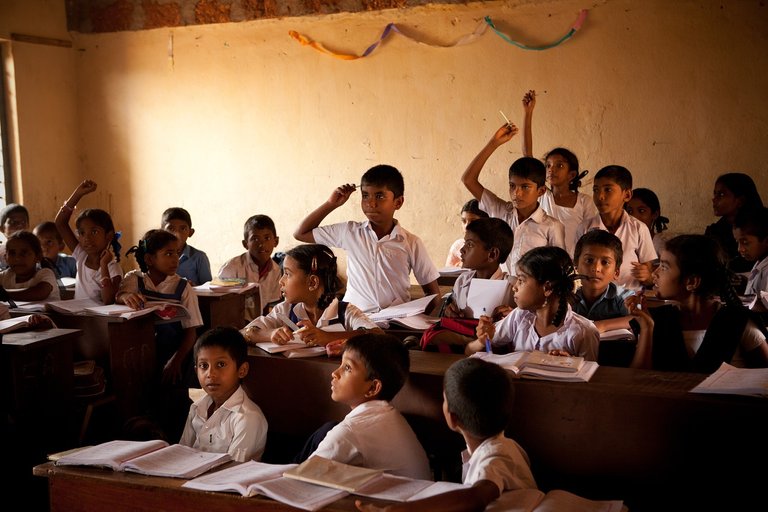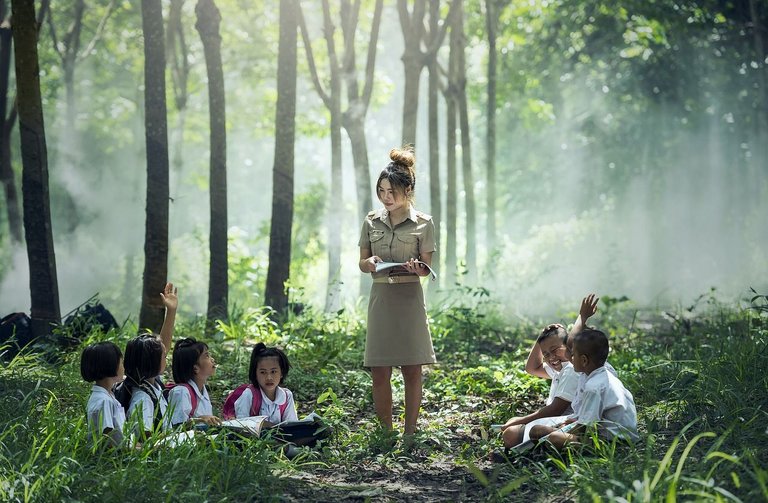School, a place of hope (English/Spanish)

A friendly greeting dear Hivers, in this opportunity I want to share with you some of my reflections on the importance of education and scientific learning for the development of more critical and fair citizens, to ensure the reconstruction of a more humane society with decent conditions for all; this from the perspective of education in my country Venezuela and from my experience as a trainer for more than six years.
In the last few days the world was shocked by the news that a submarine with five crew members had disappeared in the North Atlantic. The five sailors were multimillionaires who paid the obscene sum of 300,000 euros for a sightseeing trip to see the wreckage of the Titanic. While the media made noise and money with the story of the submersible ship, a silent tragedy had been taking place for days in the Mediterranean, where a ship full of migrants, mostly from Pakistan, Syria and Egypt, was shipwrecked, leaving more than 300 dead and many more missing. Four ships, ten helicopters, a robot submarine and two planes searched for the 5 millionaires, while no help was given to the 700 people in the Mediterranean.
This parallelism shows us once again the cruelty of a global system that decides who should die and who should not, adding or subtracting value to people's lives based on their skin color, their nationality or the amount of money they have or do not have. This savage inequality is expressed in all areas of our lives and in the midst of an industrial revolution where technological development, in just a quarter of a century, has exponentially changed the means of production and our way of interacting with them, it is clear that the owners of opportunities will be the same as always: those who have resources and access to technology.
This is how reality shows us that in many bars in Europe the bartenders are robots, while most of their young people are unemployed or transit economic instability in the precariousness of temporary jobs. In the same sense we see how an "influencer" obtains thousands of dollars for uploading a video on social networks, while in the neighborhoods or towns of Latin America some families do not even have a TV and barely have enough to eat. It was perfectly expressed by Eduardo Galeano in his book Patas arriba: la escuela del mundo al revés:
"...the world upside down is in sight: it is the world as it is, with the left to the right, the navel on the back and the head on the feet."
Thus, while globalized neoliberalism devours entire nations, stripping them of their collective memory, in the midst of the classrooms in the schools of our country we ask ourselves, what role does the teaching and learning of science play in this scenario? The question answers itself, today more than ever it is necessary to develop from schools a critical scientific thinking, capable of analyzing reality and transform it from real processes, built from each territory. And this critical scientific thinking must be developed from the initial level of basic education, ensuring that children can take an interest in their own processes and those of their environment.Considering that it is not enough to get students to analyze their reality, but they must also identify with it, feel part of it and thus re-signify the value of their family, school and community environment.
It is life that is demanding from us the production of a critical scientific knowledge aimed at the reconstruction of our humanity; as opposed to what we have learned about traditional and bourgeois science: which places us as individual researchers in front of objects of study.The school must be able to develop scientific processes where students identify themselves as part of the environment they are investigating and where they can see their peers as subjects that make up the construction of knowledge. For although science is, in its simplest definition, the search for truth, children who develop critical scientific thinking must understand that truth is neither personal nor absolute, but rather an elastic and dynamic interpersonal construction that emerges not from one person, but between people and is capable of transforming itself over time and according to circumstances.

In conclusion, social development must be promoted through the formation of active subjects within their territorial and community context, capable of developing collective processes that aim to produce true knowledge about the local reality and design feasible concrete strategies to improve the material, spiritual and intellectual conditions of all those involved; without any type of segregation that allows selective reification.
In this sense, the teaching and learning of critical science should aim at the reconstruction of a conscious, sensitive and integral human being; interested in producing knowledge that contributes to transform life into a safe, fair and friendly space for all.
Photos by Pixabay
Translated with Deepl.com
All rights reserved || @aly.squid// 2023
La escuela, un lugar de esperanza (Ingles/Español)

Un saludo amistoso queridos Hivers, en esta oportunidad quiero compartir con ustedes algunas de mis reflexiones sobre la importancia de la educación y los aprendizajes científicos para el desarrollo de ciudadanos más críticos y justos, que aseguren la reconstrucción de una sociedad más humana con condiciones dignas para todos; esto desde la perspectiva de la educación en mi país Venezuela y desde mi experiencia como formadora por más de seis años.
En los últimos días el mundo se conmociono tras la noticia de que un submarino con cinco tripulantes había desaparecido en el Atlántico Norte. Los cinco navegantes eran multimillonarios que pagaron la suma obscena de 300 mil euros en un viaje turístico para ver los restos del Titanic. Mientras los medios de comunicación se hicieron ruido y dinero con la historia de la nave sumergible, una tragedia silenciosa tenía lugar desde hacía días en el Mediterráneo, donde un barco abarrotado de migrantes, la mayoría provenientes de Pakistán, Siria y Egipto; naufragó dejando más de 300 muertos y muchos más desaparecidos. Cuatro buques, diez helicópteros, un robot submarino y dos aviones buscaron a los 5 millonarios, mientras que a las 700 personas en el mediterráneo no se les brindó ninguna ayuda.
Este paralelismo nos señala nuevamente la crueldad de un sistema global que decide quienes deben morir y quienes no, sumando o restando valor a la vida de las personas a partir de su color de piel, su nacionalidad o la cantidad de dinero que tengan o no. Esta salvaje desigualdad se expresa en todos los ámbitos de nuestra vida y en medio de una revolución industrial donde el desarrollo tecnológico, en apenas un cuarto de siglo, ha cambiado exponencialmente los medios de producción y nuestra forma de interactuar con ellos, es evidente que los dueños de las oportunidades serán los mismos de siempre: los que tienen recursos y acceso a la tecnología.
Es así como la realidad nos muestra que en muchos bares de Europa los cantineros son robots, mientras la mayoría de sus jóvenes están desempleados o transita la inestabilidad económica en la precarización de los trabajos temporales. En el mismo sentido vemos como un “influencer” obtiene miles de dólares por subir un video en las redes sociales, mientras en los barrios o pueblos de Latinoamérica algunas familias no tienen ni siquiera un televisor y escasamente les alcanza para comer. Lo expresó perfectamente Eduardo Galeano en su libro Patas arriba: la escuela del mundo al revés:
“…el mundo al revés está a la vista: es el mundo tal cual es, con la izquierda a la derecha, el ombligo en la espalda y la cabeza en los pies.”
Así pues mientras el neoliberalismo globalizado devora naciones enteras despojándolas de su memoria colectiva, en medio de las aulas en las escuelas de nuestro país nos preguntamos ¿Qué papel juega la enseñanza y aprendizaje de la ciencia frente este escenario? La pregunta se responde por sí sola, hoy más que nunca es necesario desarrollar desde las escuelas un pensamiento científico crítico, capaz de analizar la realidad y transformarla a partir de procesos verdaderos, construidos desde cada territorio. Y este pensamiento científico crítico debe desarrollarse desde el nivel inicial de la educación básica, procurando que las infancias puedan interesarse por sus propios procesos y los de su entorno. Considerando que no es suficiente conseguir que los estudiantes analicen su realidad, sino que además deben identificarse con ella, sentirse dentro de ella y así resignificar el valor de su entorno familiar, escolar y comunitario.
Es la vida la que nos está exigiendo la producción de un conocimiento científico crítico dirigido a la reconstrucción de nuestra humanidad; en contraposición con lo que hemos aprendido sobre la ciencia tradicional y burguesa: que nos ubica como individuos investigadores frente a objetos de estudio. La escuela debe ser capaz de desarrollar procesos científicos donde los estudiantes se identifiquen como parte del entorno al que investigan y donde puedan ver a sus iguales como sujetos que conforman la construcción del conocimiento. Pues si bien, la ciencia es, en su definición más simple, la búsqueda de la verdad; las infancias que desarrollen un pensamiento científico crítico deben comprender que la verdad no es personal ni absoluta, más bien es una construcción interpersonal elástica y dinámica, que emerge no de una persona, sino entre personas y es capaz de transformarse en el tiempo y según las circunstancias.

En conclusión, el desarrollo social debe promoverse a través de la formación de sujetos activos dentro de su contexto territorial y comunitario, capaces de desarrollar procesos colectivos que tengan como objetivo producir un conocimiento verdadero sobre la realidad local y diseñar estrategias concretas factibles para mejorar las condiciones materiales, espirituales, intelectuales de todos los involucrados; sin ningún tipo de segregación que permita la cosificación selectiva.
En este sentido la enseñanza y el aprendizaje de la ciencia crítica, debe tener como objetivo la reconstrucción de un ser humano consciente, sensible e integral; interesado por producir conocimiento que tribute a transformar la vida en un espacio seguro, justo y amigable para todos.
Fotos de Pixabay
Traducido con Deepl.com
Todos los derechos reservados || @aly.squid// 2023
We still have time to correct all those errors that have been dragging humanity for a long time. Good reflection
!discovery 35
!VSC
https://twitter.com/Chacald1/status/1674894261886525441?s=20
@chacald.dcymt has sent VSC to @aly.squid
This post was rewarded with 0.1 VSC to support your work.
Join our photography communityVisual Shots
Check here to view or trade VSC Tokens
Be part of our Curation Trail
@chacald.dcymt ha enviado VSC a @aly.squid
Éste post fue recompensado con 0.1 VSC para apoyar tu trabajo.
Únete a nuestra comunidad de fotografía Visual Shots
Consulte aquí para ver o intercambiar VSC Tokens
Se parte de nuestro Trail de Curación
Thanks for your support friend!!! It's a pleasure to have your visit and comment!!!!
This post was shared and voted inside the discord by the curators team of discovery-it
Join our Community and follow our Curation Trail
Discovery-it is also a Witness, vote for us here
Delegate to us for passive income. Check our 80% fee-back Program